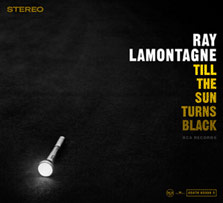 Ray LaMontagne’s recent album “Till the Sun Turns Black” ends with one of the most beautiful songs about peacemaking I’ve ever heard—in which he simply repeats the refrain “War is not the answer, the answer is within you” over the most delicately lilting instrumentation. It’s the kind of sentiment that could be accused of being too vague to have any practical meaning, but warm and positive enough to be popular. But there’s something about it that feels deeper than that.
Ray LaMontagne’s recent album “Till the Sun Turns Black” ends with one of the most beautiful songs about peacemaking I’ve ever heard—in which he simply repeats the refrain “War is not the answer, the answer is within you” over the most delicately lilting instrumentation. It’s the kind of sentiment that could be accused of being too vague to have any practical meaning, but warm and positive enough to be popular. But there’s something about it that feels deeper than that.
It comes to mind as I sit in a cramped and crowded airport in Missouri, between cities on a trip that will take me from the Deep South to the Pacific Northwest, meeting and talking with people seeking to explore faith at the margins of institutional Christianity. I’ll be part of a conference the week after next on the topic “Dangerous Living”(www.solitonnetwork.org)—a title ambiguous enough to invite further interrogation. The organizers aim to build a temporary community of fellow travelers asking questions and sharing experiences of what it means to follow the radical Jesus in a culture that often seems to privilege consumerism above all else and seeks to avoid anything resembling physical work at all costs. We’ll talk about faith and social justice—just what does it mean in our day to hear Jesus tell the rich young ruler how hard it is to get into the kingdom of heaven? We’ll investigate faith and authority: What kind of leadership is required when so many of our public role models leave so much to be desired? We’ll immerse ourselves in faith and creativity, hoping to become more attentive to the voice of God in art, film, music, and nature. Most of all, we will wonder together what it means to be stewards of the Christian tradition that we inherit without falling into the trap of religious imperialism. In other words, how can we take responsibility for sharing our faith without imposing it on others in a way that prevents anyone taking us seriously?
These questions were not far from my thoughts this afternoon, as we sat down for a meal at one of the in-house airport restaurants. Just after my Diet Coke arrived, the gentleman next to our table took a phone call, the first few lines of which went as follows:
‘Hi there—didn’t realize you were on that side of the pond. You looking for more bombers, or just drinking Irish car bombs?’
I froze in my seat, absorbing the impact of his comedic spin on the horrific conflict around which I grew up. I thought of the people I know back home in Belfast who have lost relatives or friends to bombs, sometimes hidden under their cars, and became so incensed that my body began to shake. It turns out that “Irish car bomb” is a name for a drink mixed from Bailey’s Irish Cream, whiskey, and Guinness. As the guy kept talking, I had to seriously consider whether or not to speak to him when the call was over. Wouldn’t it be a betrayal of all the Northern Ireland troubles’ dead if I remained silent? I freely admit that in the grand scheme of things, whether or not a burger-eating business-class traveler understands the pain he may cause by invoking the name of an insensitively-christened cocktail should not be the greatest of our concerns. But at the same time, I have come to believe that it is the small moments of dehumanization that allow the larger context of destruction on our planet to occur. What the late cultural critic Benjamin DeMott in the August issue of Harpers magazine calls the obsession with “impact”—the catharsis that is present when human beings watch images of other human beings violently killed—has become one of the driving forces of our society. Jokes about Irish car bombs not only reveal the ignorance of the speaker, but reinforce the often brutal way in which we are teaching ourselves to relate to each other.
In the end, I didn’t speak to our table neighbor; I felt that it would be unfair to make him carry the responsibility for all the angst I feel about the decades of death from which my home society is emerging. But when we have lost touch with our humanity—and the humanity of others—to the extent that we are willing to sacrifice the dignity of those who have died in war for the sake of the name of a drink, then perhaps our desire for “impact” is stronger than our hopes for peace. When Ray LaMontagne sings that the answer is “within you,” might he just be suggesting that we already know that the path we’re on is the way of destruction? That, for a start, we could at least commit ourselves to being careful with the words we use for fear they may re-victimize people who have already suffered far too much?
 Gareth Higgins is a Christian writer and activist in Belfast, Northern Ireland. For the past decade he was the founder/director of the zero28 project, an initiative addressing questions of peace, justice, and culture. He is the author of the insightful How Movies Helped Save My Soul and blogs at www.godisnotelsewhere.blogspot.com
Gareth Higgins is a Christian writer and activist in Belfast, Northern Ireland. For the past decade he was the founder/director of the zero28 project, an initiative addressing questions of peace, justice, and culture. He is the author of the insightful How Movies Helped Save My Soul and blogs at www.godisnotelsewhere.blogspot.com
More from Beliefnet and our partners
